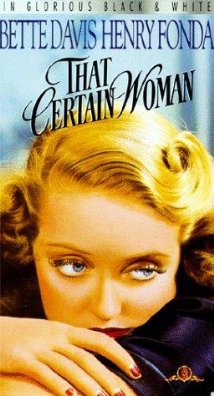
THAT CERTAIN WOMAN
US, 1937, 93 minutes, Black and white.
Bette Davis, Henry Fonda, Anita Louise, Ian Hunter, Donald Crisp, Hugh O' Connell, Katherine Alexander, Mary Phillips, Minor Watson, Sydney Toler Charles Trowbridge.
Directed by Edmund Goulding.
That Certain Woman is still quite a moving film and Bette Davis vehicle of 1937, after she had won an Oscar for Dangerous and before her second Oscar, the next year, with Henry Fonda for Jezebel.
This is a Bette Davis performance that is worth looking at again, much less strident than many of her roles, less dominating, though strong, and her doing a lot of her performance through her body language and especially communicating through her facial expressions.
She is the widow of one of the victims of the St Valentine’s Day massacre, is working for a respectable married lawyer, Ian Hunter, and living down her past and her connections. The newspaper wants to write about her. She is in love with the wealthy, rather weak character, young man, Fonda, who is dominated by his arrogant father, Donald Crisp. When they marry in secret, the father steps in to annul the marriage and sends his son to Paris where he marries his childhood sweetheart, Anita Louise.
Move on four years, Bette has a young boy, has great regard for her boss, who wants to divorce his wife but is in failing health. Fonda and his wife are involved in a car accident where she is incapacitated and in a wheelchair. Then there is one of those meetings (think of Barbara Stanwyck in Stella Dallas) between Bette and the wife, each willing to be self-sacrificing for the other. Bette makes the supreme sacrifice – but, of all things, she has been left money by her boss and so can go off to Monte Carlo, learning there that the wife has died and that there will be happiness ever after.
The film was written and directed by Edmund Golding who worked with Bette Davis The Old Maid.
1. A Warner Brothers drama of the 1930s? Strong cast, black and white photography, musical score?
2. Bette Davis film, this film in the development of her career, between Oscars? Capitalising on her skills? Her communication in body language, facial language? The character, widow, the St Valentine’s Day massacre, her wanting to disappear, the widow becoming a respectable secretary, the support of Lloyd? Her relationship with Jack? Her hopes? Lloyd and his being nice to her, knowing her background, falling in love with her?
3. Virgil Whitaker, the newspapers, her past?
4. Jack, a Henry Fonda character, wealthy, the touch of weakness, love for Mary, under his father’s thumb? Mary urging him to grow stronger? The proposal, the marriage? The reaction of his father, arriving with the doctor, the police? The confrontation, humiliating Mary, the blunt discussion, wanting to pay her off? Jack and his defence?
5. Mary waiting, Jack not coming? Continuing her work? The continued support from Amy? The news from Paris, Jack marrying Flip? Mary and her pregnancy? The four years passing, her managing, support from Lloyd, love? His relationship with his wife, wanting a divorce? His illness, his loss of reputation, dying? His wife coming to visit Mary, their talk and communication?
6. Jack and Flip, the story of the accident, her being incapacitated? Their love? Flip loving him in the past? Coming home, Mary meeting Jack, the news of their son, seeing his son, his delight? Telling his father? Jack’s father, the meeting with Mary, his severity, wanting custody of the child, condemning Mary as a mother?
7. Flip, her visit to Mary, the discussions about the nature of love, self-sacrifice? Flip willing that Jack should be with Mary? Mary, thinking about the baby, discussions with Amy, wanting the baby to be happy, and Jack and Flip together?
8. Mary, self-sacrifice, the life of Monte Carlo, inheriting the money from Lloyd?
9. News of Flip’s death, Jack seeking her out, their being together – and an emotional happy ending?